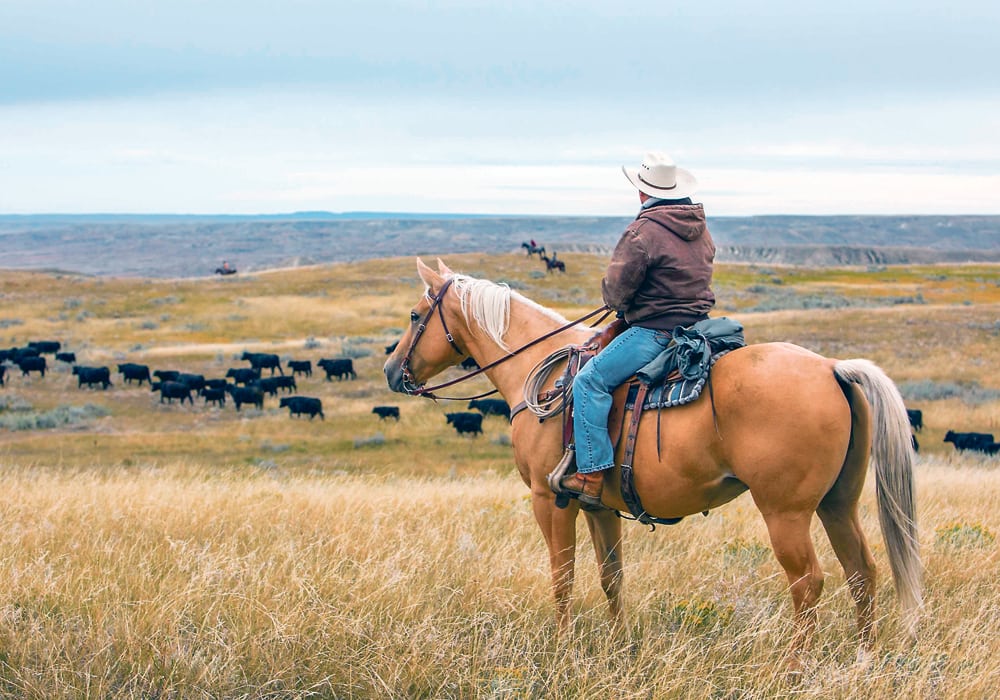In response to growing climate concerns, returning less productive annual cropland to perennial grass helps remove carbon dioxide from the atmosphere. Collectively, the impact of this program is comparable to removing 75,000 metric tonnes of carbon dioxide from the atmosphere— the same as the emissions from driving 299 million kilometres in an average passenger vehicle. Perennial grass cover also provides habitat for prairie wildlife.
“In North America’s prairie ecosystems, cattle help ensure the sustainability of grasslands,” said Karla Guyn, chief executive officer for DUC. “Cattle fertilize the soil and help maintain plant biodiversity through grazing, controlling invasive grasses and allowing other species to thrive.
“For decades, we’ve worked with Canadian cattle farmers and ranchers to conserve natural habitat on their land,” said Guyn. “This initiative builds on their long-standing environmental stewardship while providing opportunities to help support their operations. We’re grateful to have strong partners in Cargill and McDonald’s that recognize the importance of natural habitats as part of sustainable agriculture.”
Grasslands are some of the world’s most productive and diverse ecosystems, but these habitats and the species they support continue to be lost at alarming rates. Canada’s prairies contain wetlands, lakes, rivers and valleys that provide habitat to more than 60 wildlife species at risk. This project will help expand habitat and provide enhanced water quality, as grasslands naturally filter harmful nutrients from water.
The support from McDonald’s and Cargill allows DUC to provide farmers and ranchers incentives via discounted seed and technical support to help establish the forage on their land. In return, program participants agree to maintain the forage for 10 years.
“The result is a healthy, productive landscape where ranchers can graze their herd or harvest hay and a diversity of wildlife thrive,” said Guyn.
McDonald’s and Cargill are market leaders in Canadian beef. Both have made sustainability a cornerstone of how they do business, recognizing the role they play in advancing responsible food production. These companies are investing $1.25 million CAD in the Forage Program over the next five years, with DUC adding $3.75 million CAD through matching programs.
“This initiative is an example of how McDonald’s is driving toward our global climate change commitment by supporting beef farmers and ranchers in their efforts to implement practices that reduce greenhouse emissions,” says Nicole Zeni, senior manager, supply chain management, McDonald’s Canada. “Here in Canada, we’ll continue to collaborate with our partners, working together to create change and positive outcomes for farmers, ranchers, communities and the planet.”
This collaboration also supports Cargill’s BeefUp Sustainability initiative, which seeks to reduce greenhouse gas emissions throughout the company’s North American beef supply chain by 30 per cent by 2030. Cargill has launched several initiatives and three other programs to support this goal.
“At Cargill, we are in a unique position to drive sustainable beef production across North America. Through this project, we are partnering with Canadian ranchers to show how cattle are a force for good in conserving this critical ecosystem of soil, grassland and wildlife habitats,” says Heather Tansey, sustainability lead for Cargill’s global protein and animal nutrition and health businesses. “By working hand in hand, we can scale realistic solutions that address sustainability challenges and feed the world.”













